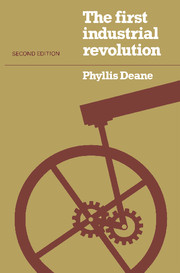Book contents
- Frontmatter
- Contents
- Preface to the first edition
- Preface to the second edition
- 1 The starting-point
- 2 The demographic revolution
- 3 The agricultural revolution
- 4 The commercial revolution
- 5 The transport revolution
- 6 The cotton industry
- 7 The iron industry
- 8 The sources of innovation
- 9 The role of labour
- 10 The role of capital
- 11 The role of the banks
- 12 The adoption of free trade
- 13 The role of government
- 14 Economic growth and economic cycles
- 15 Standards of living
- 16 The achievement
- Guide to further reading
- Subject index
- Index of authors cited
- Frontmatter
- Contents
- Preface to the first edition
- Preface to the second edition
- 1 The starting-point
- 2 The demographic revolution
- 3 The agricultural revolution
- 4 The commercial revolution
- 5 The transport revolution
- 6 The cotton industry
- 7 The iron industry
- 8 The sources of innovation
- 9 The role of labour
- 10 The role of capital
- 11 The role of the banks
- 12 The adoption of free trade
- 13 The role of government
- 14 Economic growth and economic cycles
- 15 Standards of living
- 16 The achievement
- Guide to further reading
- Subject index
- Index of authors cited
Summary
It is now almost an axiom of the theory of economic development that the route to affluence lies by way of an industrial revolution. A continuous—some would say ‘self-sustaining’—process of economic growth, whereby (wars and natural disasters apart) each generation can confidently expect to enjoy higher levels of production and consumption than its predecessors, is open only to those nations which industrialize. The striking disparity between the standards of living of the inhabitants of the so-called developed or advanced countries of the mid twentieth century and the standards prevailing in today's underdeveloped or backward countries is essentially due to the fact that the former have industrialized and the latter have not.
This does not imply that there is some definite process or event called an industrial revolution which takes the same form in all countries in which it occurs. But it does imply that there are certain identifiable changes in the methods and characteristics of economic organization which, taken together, constitute a development of the kind which we would describe as an industrial revolution. These include the following related changes: (1) widespread and systematic application of modern science and empirical knowledge to the process of production for the market; (2) specialization of economic activity directed towards production for national and international markets rather than for family or parochial use; (3) movement of population from rural to urban communities; (4) enlargement and depersonalization of the typical unit of production so that it comes to be based less on the family or the tribe and more on the corporate or public enterprise; (5) movement of labour from activities concerned with the production of primary products to the production of manufactured goods and services; (6) intensive and extensive use of capital resources as a substitute for and complement to human effort; (7) emergence of new social and occupational classes determined by ownership of or relationship to the means of production other than land, namely capital.
- Type
- Chapter
- Information
- The First Industrial Revolution , pp. 1 - 19Publisher: Cambridge University PressPrint publication year: 1980



